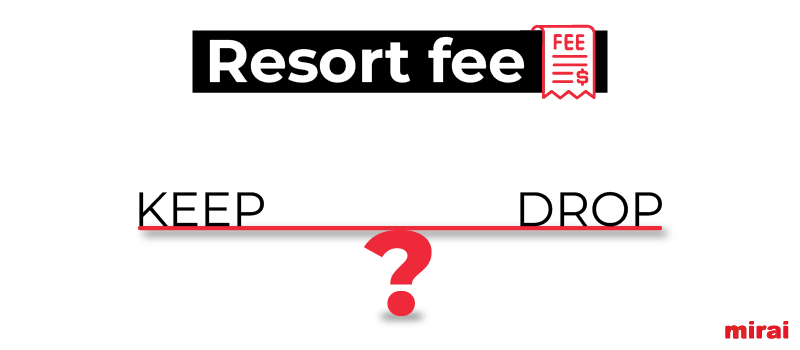Resort fees are under increasing pressure from regulators, OTAs and consumer expectations. While some advantages remain, most of the original benefits have eroded.
NB: This is an article from mirai, one of our Expert Partners
Subscribe to our weekly newsletter and stay up to date
This post helps you evaluate whether to retain or eliminate resort fees and how to do it effectively either way.

Resort, Destination, or Service fee: It’s all the same
The term “resort fee” originally referred to additional charges covering amenities such as access to the gym, pool, towels and Wi-Fi. Over time, the term evolved to “destination fee” or “service fee” as non-resort properties adopted similar practices. For simplicity, we’ll use “resort fee” throughout this article to refer to all such surcharges.
Is the resort fee actually room revenue?
Yes, for two main reasons:
- Taxation: Resort fees are taxable. While they may bypass online travel agencies (OTAs), they do not escape tax authorities such as the Internal Revenue Service (IRS).
- Mandatory Nature: Have you ever tried to refuse a resort fee because you didn’t use the gym or pool? It’s rarely, if ever, allowed. These fees are mandatory, which further supports their classification as room revenue.
A quick guide: keep or drop resort fees
Before deciding whether to continue charging resort fees, it’s worth revisiting the original rationale and examining whether those benefits still apply today.
- Reduced OTA commissions:
Until now: OTAs used to charge commissions on room revenue, but not on taxes and fees. By shifting part of the room rate to resort fees, hotels could reduce commission payments significantly.
What has changed? Booking.com, the world’s largest OTA, began charging commission on resort fees, eliminating much of the cost advantage. While Expedia generally does not charge commission on resort fees, this can vary depending on the specific program or payment model.
- Lower brand management fees:
Until now: In addition to OTA savings, many hotel brands charged management fees based only on room revenue. Resort fees were excluded, another financial win.
What has changed? Today, most major brands (Marriott, Hilton, Hyatt) include resort fees in their fee calculations, although exceptions may still exist based on specific contract terms.
- Gaming OTA sorting algorithms:
Until now: Resort fees allowed hotels to appear cheaper in OTA search results, improving visibility and click-through rates. The actual price -including fees- would only appear during checkout, often going unnoticed.
What has changed? This loophole has been largely closed. In the U.S. Booking.com now displays prices inclusive of resort fees, while Expedia goes a step further by showing the total price -including all taxes and fees- early in the booking process. Let’s remember the OTAs largely already showed final prices outside the U.S.





